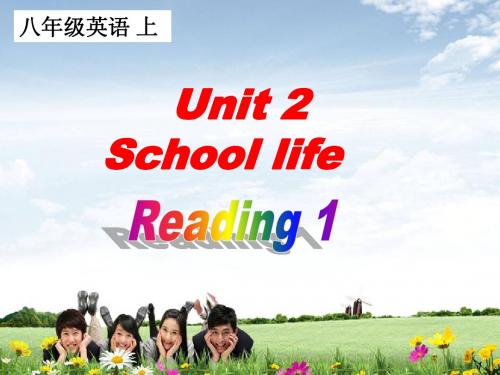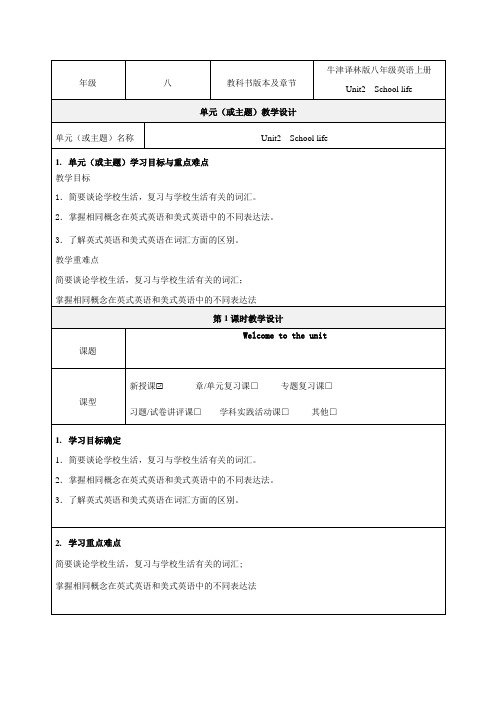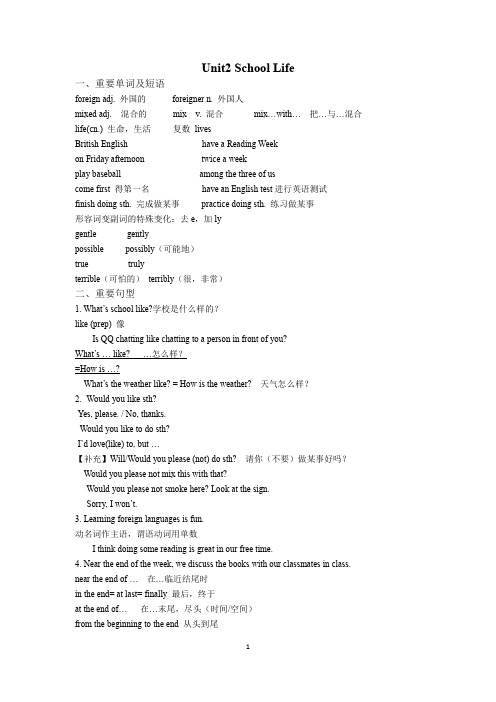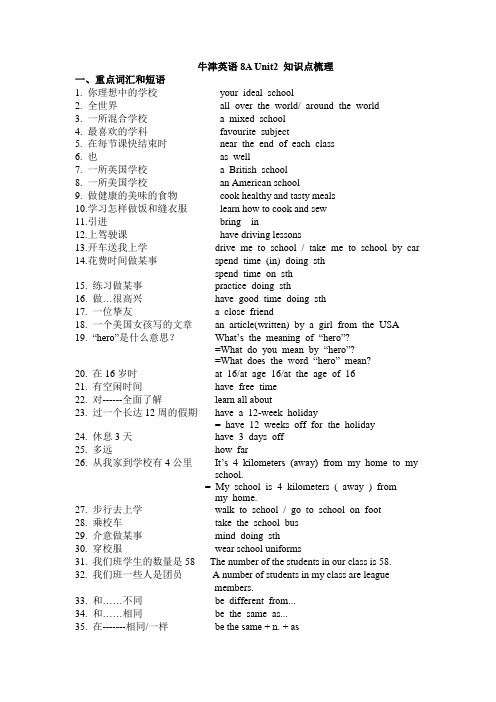牛津初中英语8AUNIT 2 School Life
牛津译林版8A Unit2 School life Reading课件(共17张PPT)

Scanning
When:
every year borrow more books from the school library
What:
bring in books and magazines from home discuss the books with the classmates in class
in the 8th grade
Different classes Buddy Club
Club Activities Reading Week
play baseball do sports 12
Post-reading
13
Have an interview with John/Nancy . (Each team chooses one student to act John / Nancy. Other members ask him / her any question about the school life.)
John
8
Skimming
Life in an American school
• Questions: • 1. When does John go to the Buddy Club? Every Monday. • 2. Do they have the same class every day? No, they have different classes every day.
10
11
The comparison between their school lives
Name School
Grade
Subjects/classes Mentioned(提及)
牛津译林版英语八上(8A)Unit2Schoollife知识点复习

牛津译林版英语八上(8A)Unit2Schoollife知识点复习牛津译林版英语八上牛津译林版英语八上((8A )Unit2 School life 知识点知识点复习复习Important phrases and sentences:Welcome to the unit1.Why don ’t sb. do sth.?= Why not do sth.? 为什么不做……?2.work harder. 更加努力3.What ’s school like? It ’s like watching TV . be like doing sth. (like 介词,介词+doing)4.fewer advertisements 更少的广告an advertisement 一则广告few/many advertisements 5.British English/ American English英式英语/美式英语6.have some plans for the weekend 有一些周末计划7.see/watch a film 看电影Reading8.in Year 8 (Year Eight) 名词+基数词(首字母都要大写)= in Grade Eight= in the eighth grade 一般情况下:名词+基数词(首字母都要大写)= the +序数词+名词(首字母小写)eg. Lesson One = the first lesson9.a mixed school. 一所男女生混合的学校10.have lessons together 一起上课11.among all my subjects 在我所有的学科当中12.like French best 最喜欢法语13.Learning foreign languages is fun. 动名词做主语,谓语动词用单数(language 作为语言不可数名词,而具体的语言是可数名词five languages 14.fun n.乐趣;娱乐活动;嬉戏,嬉闹;有趣的事adj.使人愉快的;开心的funny adj.滑稽的,可笑的what (great/good) fun! have fun doing = It is fun to do ... (都不要冠词)15.foreign languages 外语(foreigner n, 外国人)16.a Reading Week 阅读周during the week 在这周期间17.borrow 主语借入lend 主语借出borrow sth. from sb. 向某人借某物(借进)lend sth. to sb. = lend sb sth 把某物借给某人(借出)18.bring in 带来bring in books and magazines from home 从家中带来书和杂志19.near the end of the week临近每周结束时at the end of the street 在街道的尽头20.discuss sth with sb 与某人讨论某事discuss the books with our classmates in class课堂上与同学一起讨论书的内容21.seem to go faster 似乎走得更快seem to do sth. 似乎做某事seem (to be) +adj.It seems that + 从句It seems that he is angry seem angry 似乎很生气eg. He seems(to be) unhappy today.他今天似乎不高兴22.go to the Buddy Club 去同伴俱乐部23.learn more about the school 更多地了解这个学校24.listen carefully to my problems 仔细地倾听我的问题25.offer me help 向我提供帮助offer sb. sth. = offer sth. to sb. 向某人提供某物offer to do sth 主动提出做某事26.end earlier than usual.比往常结束得更早27.do sports together一起做运动28.twice a week 一周两次29.practice hard every time 每次努力练习practice doing sth 练习做某事30.win two games 赢得两场比赛31.an article by a boy from the USA.一篇美国男孩写的文章32.what else = what other things 其他的还有什么Grammar and Integrated skills/doc/65548791.html,e first in the race 在比赛中得第一名34.any other +名词单数= the other +名词复数any other student = the other studentsShe draws better than any other student in my class = She draws better than the other students in my class…的数量(谓语动词用单数形式)35.the number of …The number of the students in our school is about 1500 我们学校学生的数量大约是1500个许多,大量(谓语用复数) A number of students are playing football 许多学生a number of …在踢足球36.do morning exercises 做早操take some exercise “锻炼”不可数,其余都可数37.spend ... on sth. / (in) doing sth. 花费......做某事spend more time doing homework = spend more time on homework花更多的时间做作业spend the least time on homework = spend the least time doing homework花最少的时间做作业38.have (some time )off休息(一段时间)have two weeks off = have a two-week holiday休两周假39.half an hour 半小时three hours and a half= three and a half hours 三个半小时40.half an hour for playing computer games 半小时玩电脑游戏41.another half an hour for playing chess 还有半小时下象棋42.at most 最多,至多at least至少43.do some reading/cooking/shopping/cleaning 阅读/做饭/ 购物/ 打扫44.two hours for sports 两小时体育活动among the four of us 我们四个人中45.far—farther/ further---farthest/ furthest 但表示程度深时只能用further further study 深造Study skills and Task46.have an English test 进行一次英语测试47.have a monthly test on each subject举行各科月考48.look through 浏览look through the questions quickly快速浏览问题49.read English newspapers and magazines 读英语报刊和杂志at first 首先,起初50.keep writing in English about my daily life不断地用英语写关于我的日常生活51.learn to use English better 学会更好地使用英语52.watch English videos 观看英语录像53.have a lovely time 玩得很愉快54.my ideal school 我理想的学校(adj)55.finish school 毕业56.need to get up early 需要早起57.have lots of time for after-school activities 有许多时间进行课外活动58.half an hour of homework 半个小时的作业have an hour for lunch 有一小时午餐(时间)59.a big clean dining hall 一个大而清洁的餐厅60.wear uniforms 穿校服wear ties 系领带61.choose subjects to study 选择学科来学习62.a football field 足球场 a swimming pool 游泳池63.go on a school trip 进行一次学校旅行64.have fun = have a lovely/good/nice/great/wonderful time 玩得愉快语法A.比较事物的数量1.many (修饰可数名词)/much (修饰不可数名词)----more ----most比…..数量多.more + 可数名词复数/ 不可数名词+ than ...…Eg;I have more friends than you.2.few (修饰可数名词) -----fewer----fewestlittle (修饰不可数名词)----less-----leastfewer +可数名词复数+ than ……比…..数量少There are fewer boys than girls in our class.less + 不可数名词+than ……比…..数量少I spend less money on food than my sister.3.the fewest +可数名词复数在….中最少He has the fewest books.4.the least +不可数名词在….中最少She has the least money of us.5. the most + 可数名词复数/ 不可数名词最多Daniel has the most money.B.副词的比较级和最高级1.一般在词尾直接加er或est,例如,hard-harder-hardestfast-faster-fasterestLoud-louder-loudest2、部分双音节词和多音节词分别在原级前加more构成比较级和most构成最高级,例如:Slowly-more slowly-most slowlyClearly-more clearly-most clearly Carefully-more carefully-most carefully 3、副词比较级和最高级的不规则变化well-better-bestbadly-worse-worst。
8A Unit2 《 School life》单元教学设计-优秀教案

Step 2操练
1.让学生独立完成B1部分,两人一组核对答案,然后全班一起口头核对,以进一步巩固对词义的理解。
2.让学生看B4部分对话内容,问学生一些有关John的问题,检查他们是否理解对话内容,如:
⑸How often does John go to the Buddy Club? What can students do there?
⑹Who is Tony? Why does John think Tony is his hero?
⑺Why do John and his friends do sports together on Friday afternoon?
2.教师说:All thestudents in our class are clever.We should learn from each other.Ilove our class.It’s like a big family.What about you?接着向学生提问:What’s our school like?接受任何合理的回答,从而学习“What’s …like?”和“It’s like…”的句型,并进行巩固训练。
教学重难点
简要谈论学校生活,复习与学校生活有关的词汇;
掌握相同概念在英式英语和美式英语中的不同表达法
第1课时教学设计
课题
Welcome to the unit
课型新授课☑ຫໍສະໝຸດ /单元复习课□专题复习课□习题/试卷讲评课□ 学科实践活动课□ 其他□
牛津英语8A Unit2 School life知识总结

Unit2 School Life一、重要单词及短语foreign adj. 外国的foreigner n. 外国人mixed adj. 混合的mix v. 混合mix…with… 把…与…混合life(cn.) 生命,生活复数livesBritish English have a Reading Weekon Friday afternoon twice a weekplay baseball among the three of uscome first 得第一名have an English test进行英语测试finish doing sth. 完成做某事practice doing sth. 练习做某事形容词变副词的特殊变化:去e,加lygentle gentlypossible possibly(可能地)true trulyterrible(可怕的)terribly(很,非常)二、重要句型1. What’s school like?学校是什么样的?like (prep) 像Is QQ chatting like chatting to a person in front of you?What’s … like? …怎么样?=How is …?What’s the weather like? = How is the weather? 天气怎么样?2. -Would you like sth?-Yes, please. / No, thanks.- Would you like to do sth?-I’d love(like) to, but …【补充】Will/Would you please (not) do sth? 请你(不要)做某事好吗?Would you please not mix this with that?-Would you please not smoke here? Look at the sign.-Sorry, I won’t.3. Learning foreign languages is fun.动名词作主语,谓语动词用单数I think doing some reading is great in our free time.4. Near the end of the week, we discuss the books with our classmates in class. near the end of … 在…临近结尾时in the end= at last= finally 最后,终于at the end of… 在…末尾,尽头(时间/空间)from the beginning to the end 从头到尾There will be a monthly test at the end of this month.There is a coffee shop at the end of the road.discuss v. 讨论discussion n. 讨论discuss sth. with sb. 与某人讨论某事【注意】discuss = talk about, 不能与about连用He likes to discuss his problems with his classmates.in class 在课堂上5.seem+adj.seem to do sth. 似乎做某事=It seems that从句It seems that Lily is very happy.=Lily seems to be very happy.6. borrow 借来borrow sth. from sb./sp. 从某人/某处借来某物lend借出lend sb. sth.= lend sth. to sb. 把某物借给某人keep 借用一段时间How long can I keep the book?You can borrow two books from the library, and you can keep them for two weeks, but you can’t lend them to others.7. offer to do sth. 主动提出做某事offer sb. sth. = offer sth. to sb. 主动给某人提供某物He offered me a glass of milk.= He offered a glass of milk to me.8.Our team won two games last month.win v. 赢过去式won winner n. 获胜者Which team won the basketball match last night?These are the medals and cups.9.I read an article by a boy from the USA.by 由… 创作What do you think of the book by MoYan?10. careful adj. 小心的,认真的carefully adv. 小心地,认真地careless adj. 粗心的carelessly粗心地Amy is careful. She always listens carefully to the teachers in class.The more careful you are, the fewer mistakes you will make. 你越认真,你将犯越少的错误。
牛津英语8A Unit2 School life默写整理

8A Unit 2默写单词广告(n.) ________ 英国的_________ 美国的_________ 假期________ _________电影__________ __________ 混合的________ 混合(v.)_________法语__________ 法国_________ 外国的__________ 外国人__________语言__________ 国际象棋_______________最多______________在.....期间__________ 讨论(v.) (n.)_________ 制服_____________主动提供结束_________ 赢得过去式获胜者每日的,日常的__________ 快的__________ 每周的__________自始至终,从头到尾____________真实的__________ 完成,结束__________午餐时间_______________物理学__________ 羽毛球__________理想的___________ 棒球___________最少的____________花费___________写出下列单词的比较级和最高级good/well ___________ ___________ ill/bad/badly___________ ___________many/much___________ ___________ little___________ ___________old ___________ ___________ ___________ ___________far___________ ___________ ___________ ___________funny___________ ___________ pretty___________ ___________easy___________ ___________词组&结构从…借某物_____________________ 借用一段时间用__________把某物借给某人_____________________=_____________________和某人讨论某事_____________________阅读周_____________________一周两次_____________________ 打棒球_____________________提供给某人某物_____________________=_____________________似乎,好像做某事_____________________=_____________________在每节课临近结束时_____________________认真倾听我的问题_______________得第一_____________________ 在我们三个人中________________________ 做早操______________________________ 在我们日常生活中________________________花费时间在兴趣爱好上_____________________ 有月考______________________一直做某事________________________ 让某人一直做某事________________________有很多时间进行课外活动__________________________________________……怎么样?(2种)________________________=________________________休……假________________________ 从头到尾_____________________一些____________________,作主语,谓语动词用__________,修饰number用__________或__________来表示数量的多少……的数量____________________,作主语,谓语动词用__________……的数量是多少?________________________________句子学校生活是什么样的?_______________________________________它像看电视一样。
牛津英语8AUnit2Schoollife教案

⽜津英语8AUnit2Schoollife教案8A Unit2 School lifePeriod 1-5常州市北郊中学秦敏Period 1Comic strip and Welcome to the unit教学⽬标1. 简要谈论学校⽣活,复习与学校⽣活有关的词汇2. 掌握相同概念在英国英语和美国英语中的不同表达法3.了解英国英语和美国英语的有关区别教学内容四会内容词汇:British lift post eraser fall vocation math movie词组:go to school be like watch TV句型:Why don’t dogs go to school, Eddie?What’s school like?It’s like watching TV, but there are fewer advertisements.其他内容词汇:elevator soccer词组:be smarter than fewer advertisements教学准备1. 教学图⽚2. 录⾳机3. 多媒体教学步骤Step I 呈现1. 在看卡通漫画之前,先复习有关描述品质的形容词,特别讲解smart ⼀词以及形容词⽐较级结构和There be 句型。
2. 如有必要,可提前教授What is …like? It’s like …的句型。
向学⽣提问:What is our school like?Step II 阅读1. 播放Comic strip 部分录⾳前,让学⽣思考问题:What does Eddie think school is like?听完请学⽣回答。
2. 打开课本,让学⽣看⼏分钟漫画。
⿎励学⽣就其对话进⾏提问。
如:Is school fun?Is school like watching TV?3. 学⽣跟随录⾳机朗读,先集体朗读,再分⾓⾊朗读,最后表演。
Step III 活动1.在学⽣掌握了漫画中的信息后,教师可将此漫画作为起点,引导学⽣想有关What’s schoollike?的话题。
牛津译林英语8A Unit2 School life知识点

牛津英语8A Unit2 知识点梳理一、重点词汇和短语1. 你理想中的学校your ideal school2. 全世界all over the world/ around the world3. 一所混合学校 a mixed school4. 最喜欢的学科favourite subject5. 在每节课快结束时near the end of each class6. 也as well7. 一所英国学校 a British school8. 一所美国学校an American school9. 做健康的美味的食物cook healthy and tasty meals10.学习怎样做饭和缝衣服learn how to cook and sew11.引进bring in12.上驾驶课have driving lessons13.开车送我上学drive me to school / take me to school by car14.花费时间做某事 spend time (in) doing sthspend time on sth15. 练习做某事practice doing sth16. 做…很高兴have good time doing sth17. 一位挚友 a close friend18. 一个美国女孩写的文章an article(written) by a girl from the USA19. “hero”是什么意思?What’s the meaning of “hero”?=What do you mean by “hero”?=What does the word “hero” mean?20. 在16岁时at 16/at age 16/at the age of 1621. 有空闲时间have free time22. 对------全面了解learn all about23. 过一个长达12周的假期 have a 12-week holiday= have 12 weeks off for the holiday24. 休息3天have 3 days off25. 多远how far26. 从我家到学校有4公里It’s 4 kilometers (away) from my home to myschool.= My school is 4 kilometers ( away ) frommy home.27. 步行去上学walk to school / go to school on foot28. 乘校车take the school bus29. 介意做某事 mind doing sth30. 穿校服wear school uniforms31. 我们班学生的数量是58 The number of the students in our class is 58.32. 我们班一些人是团员 A number of students in my class are leaguemembers.33. 和……不同be different from...34. 和……相同be the same as...35. 在-------相同/一样be the same + n. + as= as + adj. + as the same size as= as big as36. 一起上课have lessons together37. 在网上聊天chat online / chat on the Internet38. 在电话里聊天chat on the phone39. 如果……怎么办?What if...?40. 表示惊讶show surprise41. 课外活动after-school activities42. 有一个小时吃午饭have an hour for lunch43. 听流行音乐listen to pop music44. 据说It is said that…45. 做……有问题have problems (in) doing sth在…方面有问题have problems with sth46. 做早操do morning exercises47. 暑假时间的长度the length of summer holiday48. 在学校的一边on one side of our school49. 一个---另一个one...the other...50. 参加学校旅行去博物馆go on a school trip to a museum二、重要语言点1.Why don’t/ doesn’t/didn’t sb do sth? = Why not do sth表示建议的句型总结:①Why not / Why don’t you①How/ What about...①Shall we...①Let’s do...①You’d better do...2.have to 不得不(客观原因造成)* have to +v.原* have/has/had to do sth (时态变化)* don’t/ doesn’t /didn’t have to(否定形式)He has to finish homework before watching TV.他不得不在看电视之前先完成作业。
牛津初中英语8Aunit2SchoollifeReading说课稿

8Aunit2 Reading (1)说课稿Good morning, honorable judges. Today I feel very happy to have the chance to communicate with you about the teaching plan of Unit 2 Reading from Book 8A Fun With English. I will divide the instructions into seven parts. They are Teaching Material Analysis, Teaching Aims, Teaching Emphasis, Teaching Difficulties, Teaching Methods, Teaching Aids and Teaching Procedures.Part 1 Teaching Material AnalysisThis lesson is from unit2 of 8A Fun with English.This is the second topic “school life”in module one ‘teenage life’. The passage is focused on “school life”in British and American schools. And it aims to get students to learn the differences between foreign culture and native culture. And such a topic is related to students’daily life.So students will have great interest in it. This period can input lots of useful words and phrases about school life into students’mind, which will lay a good basis for the output in main task. Therefore, this lesson is in the important position of the teaching material.Part 2.Teaching Aims1. Knowledge Aims:After the lesson, students should be able to(1)Master the four-skilled words and phrases.(2)Learn life in a British school and an American school.2. Ability Aims:(1)Improve the abilities of getting information by scanning,(2)Talk about school life in British school and American school.3. Emotional Aims:To promote their love for their school and school lives.Part3.Teaching Emphasis1. To develop the ability of general reading and acquiring information.2. To master vital phrases sentences and structures about subjects and activities.Part4.Teaching DifficultiesHow to use the words and phrases to talk about their own school life..Part5.Teaching MethodsIn this lesson , I will adopt Three-stage model and Task-based Language Teaching Method.The English Curriculum Standard advocates teachers to adopt the task-based language Teaching. Because it can stimulate students’initiative in learning and let students experience success in the process of completing tasks. By experiencing and practicing, form students’sufficient competence in using thelanguage.Part 6.Teaching Aids.Multi-media player, tape recorder, the blackboardPart7.Teaching ProceduresStep1. Pre-teaching1.Lead in by asking and answering Qs about school life.(1)What subjects do you learn at school?(2)What after-school activities do you have?(3)Have you joined a club?Ask two students to talk about his / her school life.(Purpose: T o stimulate recall of relevant knowledge and arouse students’ interest in today’s topic.)2. PresentationShow two flags with the words “life in a British school” and “life in an American school” and discuss the question.What do you think British or American school would be like?(purpose: To invite students to think and imagine and collect as many ideas as possible by brainstorming.)Step2.While-reading1. Fast ReadingRead the passage quickly to get the general idea and answer the two questions:(1)Who wrote the first passage? (John)(2)What activities does the school have every week? (Reading Week)(Purpose: To develop the skills of skimming and how to gain the main idea of the article.)2. Detailed ReadingRead the passage again and tell if the sentences are true of false.(1) In a mixed school, boys and girls have lessons together. ( T)(2) John’s favorite subject is English.( F)(3) Students at John’s school can read magazines during Reading Week.( T)(4) Students must not talk in class during Reading Week.( F)(Purpose: To develop the skills of scanning and how to gain the details of the article.)Read the second passage quickly and answer the two questions.(1)Who wrote the second passage? (Nancy)(2)Who else are mentioned in the passage? (Julie)Read the second passage carefully and answer the two questions(1)How does Nancy go to school every day?(In his brother’s car.)(2)What do the students do in the Buddy Club?(Older students talk to new students about school life.)(3)What do American students do during the lunchtime?(They meet their friends and have a great time chatting with each other.)(4)What do the students sometimes do after school?(They go to the shopping malls after school.)Step3.Post-reading(Purpose: To compare the school life between the two schools, let students have a clear idea about their differences.)Task2:Look at the table and try to retell John’s and Nancy’s school life. The teacher does it first as an example. Then ask students to practice it in pairs. Then ask some pairs to act it out.(Purpose: To develop the skills of retelling according to key words. And pair- work can let students share their knowledge and check mistakes by themselves.)Task3:Ask students to say something about their own school life using the words and phrases they have learnt today.( Purpose: Make students produce information using the input information. Help them to enhance retention and acquire the competence of using the language.)Homework:1. Finish the passage by completing the blanks.2. Retell John’s or Nancy’s school life for better students..3. Write a short passage about their own school life.(Purpose: Assign different tasks for students with different levels. I hope to inspire students’confidence in learning English by experiencing the success. And make every student make progress. This is the ideas of the English curriculum standard.)Teaching Reflection:During my teaching, I’ll try my best to get my class lively and encourage students to take part in the activities. I design different tasks to create chances for students to practice the language. That is “learning by doing, learning by using.”Therefore, the students can be the masters of theclass-teaching. And student- centered method id well-shown.。
- 1、下载文档前请自行甄别文档内容的完整性,平台不提供额外的编辑、内容补充、找答案等附加服务。
- 2、"仅部分预览"的文档,不可在线预览部分如存在完整性等问题,可反馈申请退款(可完整预览的文档不适用该条件!)。
- 3、如文档侵犯您的权益,请联系客服反馈,我们会尽快为您处理(人工客服工作时间:9:00-18:30)。
2. Ask two students to talk about his/her school life.
Step II Presentation (within 30 minutes)
Part A Show two flags with the words ‘Life in a British school’ and ‘life
4. Read together with the tape .
Part D Language points:
(It aims to introduce their usage by some examples.)
1. how to do something
2. taste-tasty
3. tell our English teacher what we are reading.
school lives and read them out.
Step V Assignment
1. Retell John’s or Nancy’s school life.
2. Write a composition about our own school life.
Finally, evaluation and reflection:
English.
First, the analysis of the textbook:
1. The contents:
The part of the reading in the second unit aims to introduce school
life in British and American schools and it aims to get the students to
2. as well & either
3. It takes less time than taking the bus.
4. have a great time doing sth
That’s all. Thank you.
What do you think British or American school would be like?
Life in a British school Life in an American school
Language points:
1. tell our English teacher what we are reading
learn the differences between foreign culture and native culture.
2. The teaching aims:
(1)The aims of the knowledge: To learn life in a British school or an
Next, the teaching methods:
Teach the students by the five teaching steps gradually to emphasize
the contents. The teacher is to act as a guide and the students as an
in an American school’ and discuss the question: What do you think British
or American school would be like?
Part B 1. Listen to the tape about Passage One to get general ideas and
Evaluate the effect of this class and improve it afterwards.
In addition, I will attach my design of the blackboard.
Design of blackboard:
Unit 2 School Life
and writing.
(3)The aims of the emotion: To promote their love for their school and
school lives.
3. The teaching emphasis:
(1) To get the ability of general reading and acquiring information.
1. Make up a dialogue with partner to talk aboutNancy’s school life. (one
pair)
2. Say something about our own school life. (one or two students)
If I have some more time, I will ask the students to write down their
4. as well & either
5. It takes less time than taking the bus.
6. drive me to school
7. have a great time doing sth
There are some other useful phrases:
1. near the end of each class
actor to do the activities.
Then, the teaching aids:
Projector, Slide show, Tape recorder and Pictures
Afterwards, the design of the teaching procedure and the class activities.
correct them.
Part C 1. Listen to the tape about Passage Two to get rough ideas and
think about two easy questions:
(1) Who wrote the second passage?
(2) Who else are mentioned in the passage?
Step III Consolidation (within 5 minutes)
Do exercises in workbook on Page 44 No. 6 and then check out the answers.
Step IV Oral practice (within 5 minutes)
2. Read then ask and answer:
(1) What did Jim do in school last year?
(2) How doesNancygo to school every day?
(3) What do the students do in the Buddy Club?
American school and to master important language points.
(2)The aims of the abilities: To improve the abilities of getting
information by scanning and the abilities of listening, speaking, reading
(4) What do American students do during lunchtime?
(5) What do the students sometimes do after school?
3. Complete the left T or F exercises in Part C1 and correct them.
(2) To master vital phrases and sentence structures.
4. The teaching difficulties:
(1)We have to tell our English teacher what we are reading.
(2)This is great because it takes less time than taking the bus.
Step I Lead-in (within 5 minutes)
1. Ask and answer about school life.
1 )What subjects do you learn at school?
2 )What after-school activities do you have?
think about two easy questions:
(1) Who wrote the first passage?
(2 )What activities does the school have every year?
2. Read and complete the first five T or F exercises in Part C1 and
牛津初中英语8AUNIT 2 School Life说课稿
牛津初中英语UNIT 2 School Life说课稿
Introduce myself:
My name is Lu Guojuan. I have worked inZhangqiaoMiddle Schoolfor 5
years. Today I want to talk about Unit 2, School Life Reading,8A,Oxford
